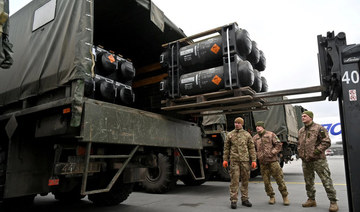WASHINGTON: Ukraine’s Volodymyr Zelensky will travel to Washington Tuesday to meet President Joe Biden and plead his case before Republicans balking at sending more money for his fight against Russia, amid warnings aid will run out in weeks.
In a flurry of diplomatic activity after the White House announced Zelensky’s visit, an aide for Mike Johnson said the new Republican speaker for the House of Representatives — who has been trying to tie Ukraine aid to funding for US border security — will also meet with the Ukrainian leader Tuesday.
And a Senate official said Democratic majority leader Chuck Schumer and Republican leader Mitch McConnell likewise invited Zelensky to speak at an all-Senators meeting Tuesday morning — one week after several Republicans angrily walked out of a classified Ukraine briefing that he had been due to address via video.
Biden and Zelensky “will discuss Ukraine’s urgent needs” as it fights off a Russian invasion, and “the vital importance of the United States’ continued support at this critical moment,” White House Press Secretary Karine Jean-Pierre said in a statement.
The Ukrainian presidency said the meeting will focus on key issues such as “joint projects on the production of weapons and air defense systems, as well as the coordination of efforts between our countries in the coming year.”
Republican senators last week blocked $106 billion in emergency aid primarily for Ukraine and Israel after conservatives balked at the exclusion of immigration reforms they had demanded as part of the package.
It was a setback for Biden, who had urged lawmakers to approve the funds, warning that Russian President Vladimir Putin would not stop with victory in Ukraine and could even attack a NATO nation.
Shalanda Young, head of the White House Office of Management and Budget reiterated that fear on CBS’s Face the Nation on Sunday, warning that “our national security is also influenced” by Ukraine’s fate.
“What happens if Putin marches through Ukraine, what’s next? NATO countries, our sons and daughters, are at risk of being a part of a larger conflict,” she said.
But Republicans remained skeptical, with Senator JD Vance, a close ally of former US president Donald Trump, dismissing the idea of Putin putting NATO countries in the region at risk “preposterous.”
He told CNN on Sunday that he opposes a “blank check” for Ukraine.
“You need to articulate what the ambition is. What is $61 billion going to accomplish that $100 billion hasn’t?” Vance said.
“What’s in America’s best interest is to accept Ukraine is going to have to cede some territory to the Russians and we need to bring the war to a close.”
The funding row underscores signs that Western support for Ukraine is fraying just as Kyiv’s counteroffensive falters and Putin’s forces push for new gains.
Ukraine’s offensive has employed billions of dollars’ worth of Western weapons — but the front lines have barely shifted in more than a year and Russian attacks along the front have intensified.
The White House said Biden’s meeting will come at a vital moment, “as Russia ramps up its missile and drone strikes against Ukraine.”
At the start of December, Putin signed a decree to boost Russian forces by 15 percent, increasing the army by some 170,000 people.
Moscow has recently given signs about a possible peace deal, although one involving a shrunken, neutral Ukraine that would be impossible to swallow for Zelensky.
The US State Department announced a stopgap $175 million tranche of new aid for Ukraine on Wednesday, including prized HIMARS rockets, shells, missiles and ammunition.
US Secretary of State Antony Blinken insisted on Sunday that “Ukraine has done an extraordinary job” defending itself.
“The choice is very clear,” he said on ABC. “If we do this and help Ukraine sustain the achievements that it’s made, help ensure that Russia continues to suffer a strategic failure in in Ukraine. That’s one route to go.
“The other route to go is to do something that the only people who are rooting for it are in Moscow, and maybe in Tehran and Beijing, which is not to provide this assistance,” he said.




























